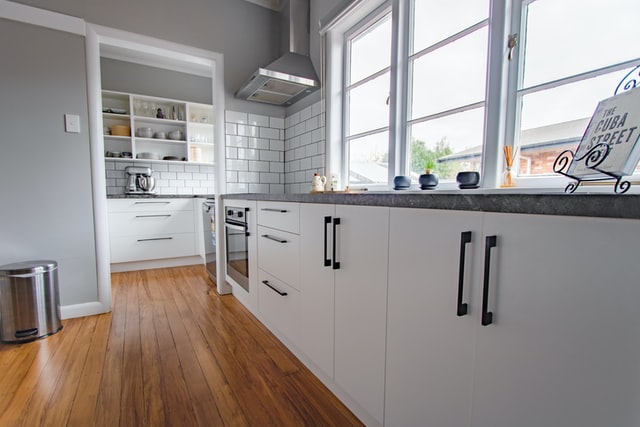Picking the Right Floors When Renovating a Kitchen
Renovating a kitchen is one of the more exciting updates you can do for your home. The kitchen has become — or perhaps has always been — a central gathering place in the home. We typically begin each day in the morning in the kitchen and we recap our days at school or the office over dinner there in the evening. Simply put… you are going to spend a lot of time in your kitchen, which is great! It does, however, mean you will want to ensure your kitchen renovation is exactly to your liking.
Picking out new cabinets and paint colors is so much fun. And all of the choices for countertops and backsplashes can have you lost in the Pinterest vortex for hours on end. That does not even mention the different appliances and modern gadgets available when redesigning a kitchen. There are so many things to consider when renovating a kitchen that you might forget about a crucial aspect: the flooring.
There are myriad options available for new kitchen flooring. Below, we have outlined a few of the more popular options, including the pros and cons of each. Let us know your preferred kitchen flooring in the comments, and as always, if you have any questions about renovating your kitchen, contact Limitless Renovations today to speak to our in-house design experts!

Tile Flooring
Tile is perhaps the most classic choice, but that does not mean it is outdated or lacks a modern feel. Today, tile manufacturers can craft unique pieces that look and feel like wood or even metal, like Daltile’s Embold line. Tile holds up incredibly well, and it presents a sophisticated look to any kitchen. Using tile flooring is one way to get the feel of marble floors without the costs associated with them if your budget has constraints. While tile is the most moisture-proof option, that does not mean it is impervious to it. Sealing your grout will be very important if you go with tile.
Hardwood Flooring
Hardwoods are found in many kitchens, believe it or not. While some people might feel there is too much moisture to make them work, as long as you do not let spills sit for long stretches before cleaning them, hardwood floors can thrive in the kitchen. One way to help prevent water damage is to seal your flooring after it has been installed, or site-finish it. This helps create a more effective barrier to entry for any water that might find itself on the floor.

Laminate Flooring
Laminate has come a long way since it was first mass produced for flooring. Today’s laminate includes some of the highest quality material built to last. Much like hardwood, installing laminate in your kitchen comes with some risks relating to moisture. Similar to hardwood flooring, cleaning up spills in a timely manner will go a long way to ensuring your floors stay dry and lessen the impact moisture can inflict on them.
Marble Flooring
Perhaps the most iconic material for kitchen floors, marble is crisp, clean, and incredibly durable. It is also going to be the more expensive option, most likely. However, marble flooring installed correctly — and properly maintained — will last as long as the house stands. Maintaining marble properly is tedious, however. You will need to seal your marble flooring annually to ensure moisture does not finds its way into your marble. Marble can also stain easily, so if your new kitchen will be home to young children, you may want to look at other, less easily stainable surfaces.
As with any decision when determining how your kitchen renovation will go, speak with your design professionals and installation experts as to what makes the most sense for your needs. Limitless Renovations can handle any kitchen renovation job you can throw at us, and we will gladly walk you through your options and find the best flooring for your lifestyle.


